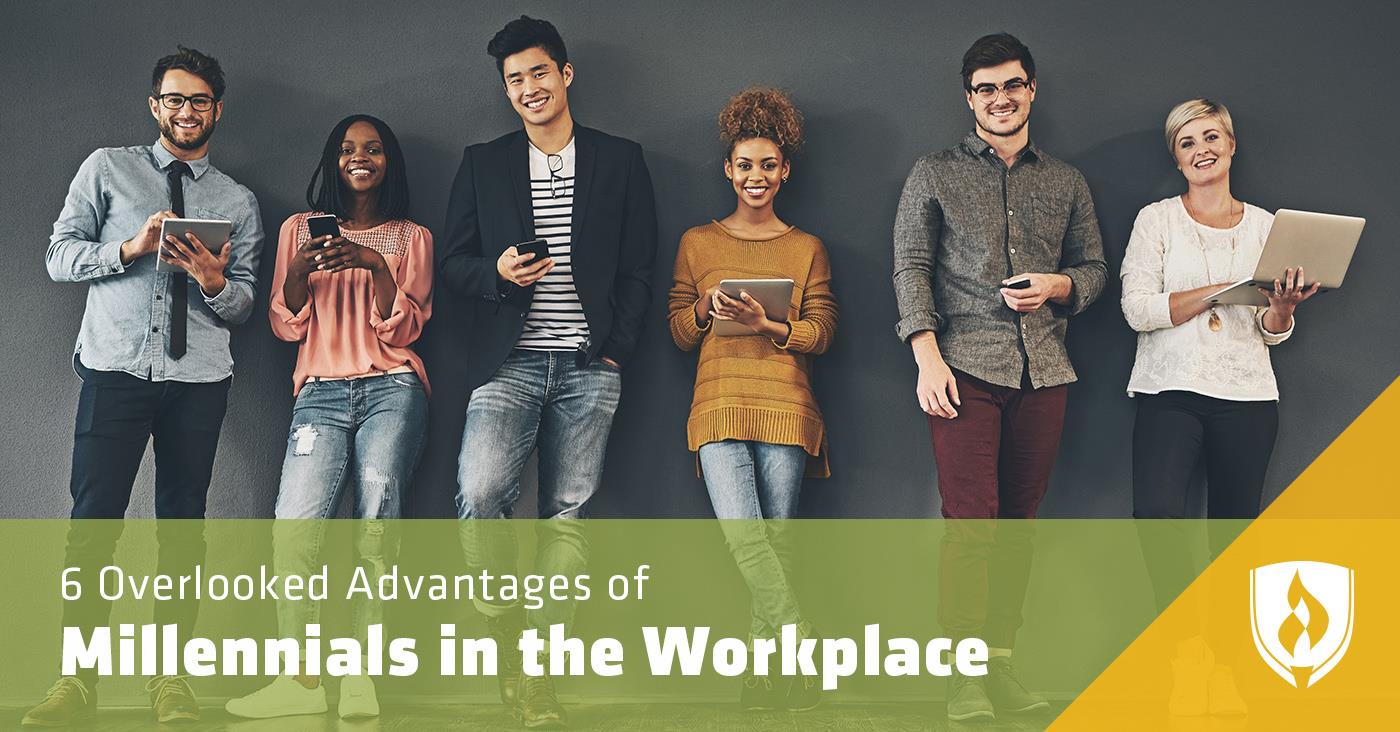
Some hear the term, “millennial” and instantly think of a group of lazy, entitled kids who are anything but prepared for a professional working environment. Others would argue that millennials are largely misunderstood—that they’re simply products of the context into which they were born, and they’re making do with the hand they’ve been dealt.
Whatever your opinion on the millennial generation (also known as Generation Y), there are some objective facts about the demographic alongside just as many widely believed misconceptions. Join us as we hear from experts and dive into research studies to dissect the facts and falsehoods about millennials. Along the way, you’ll learn how some of the supposed disadvantages associated with millennials can actually be assets in many careers.
6 Myths about Millennials that are actually workplace advantages
There are plenty of commonly held beliefs about millennials that, while maybe anchored by a sliver of truth, tend to overgeneralize and make broad conclusions based on those facts. Before we dive deep into millennial myths, let’s first get a look at the facts surrounding this generation, so we can better understand what drives this perception.
Facts about millennials that shape the public’s perception
Research into this generation has been ongoing for decades. Based on current studies, here are some facts we know to be true about millennials:
- While there’s some debate on who qualifies as millennial, a commonly accepted age range for millennials includes those born between 1981 and 1996.
- A Pew Research Center study finds that millennials are the most unmarried, racially diverse and financially burdened generation yet.1
- They are also the most educated generation to date, according to another Pew study.2
- Millennials will make up as much as 75 percent of the U.S. workforce by 2025.3
- Those belonging to Generation Y are earning an inflation-adjusted 20 percent less than their parents did, according to a Young Invincibles study.4
While these bits of information are among many we know to be true about millennials based on extensive research, there are also claims that many assume to be factual but are either half-truths or simply don’t hold water when it comes to this generation. Take a look at the following myths and consider the many ways our panel of professionals actually see them as workplace advantages.
1. “Millennials are too obsessed with technology.”
With many having come of age alongside the evolution of the internet, millennials are undoubtedly more technologically and digitally proficient than generations prior. This bears obvious advantages for the workplace today. “Because they tend to be savvy with things like cloud applications and toggling between multiple platforms, they can accomplish very quickly what older workers may struggle with,” explains author and executive John Arthur.
“Millennials tend to be highly resourceful,” Arthur adds. “They are often much more aware of the resources available to them. This can save a ton of time in the workplace.”
The greatest misconception when it comes to the relationship millennials have with technology is that their obsession breeds an inability to disconnect when their efforts are needed in a more physical sense in the workplace. “Due to the technology-driven world they grew up in, millennials are assumed to be obsessed with technology and unable to set boundaries between their personal and work lives,” explains Steve Wang, entrepreneur and experienced human resources professional.
“While millennials are indeed tech-savvy and social-media hungry, they grew up in this fast-paced environment,” Wang says. “Which means they’re used to having to make this distinction between what’s personal and what’s work.”
2. “Millennials are thin-skinned and can’t handle criticism.”
Productively accepting constructive criticism is an important aspect of just about any job. Somewhere along the line, it became an accepted thought by many that millennials are unable to do so gracefully. “Millennials often get a bad reputation as softies who can’t handle tough criticism,” Wang says.
Wang asserts that in his experience this is complete nonsense. “In fact, millennials arguably handle criticism better than anyone else because they respect everyone else’s opinions—even if it’s against their own.”
In addition to valuing the thoughts of others, Generation Y has been found to actually crave consistent feedback, with as many as 80 percent reporting that they want to receive regular feedback from their managers, according to a study conducted by Viacom.5 Employers would do well to acknowledge and accommodate their millennial employees’ desire for feedback as it presents an opportunity to reward positive behavior and improve on what’s lacking.
“Millennials tend to be very coachable, as well,” Arthur says. “They are used to feedback loops and really like to know how they are doing.”
3. “Millennials are bad with money.”
Another misconception floating around is that millennials are lacking when it comes to the financial wisdom required to be successful today. It’s also true that many who subscribe to this belief may not pin the blame for this one entirely on Generation Y.
The apparent differences in financial success we’ve seen from this generation in comparison to generations prior may have less to do with millennials themselves and more to do with a difference in opportunities and economic conditions compared to past generations. For example, home prices are historically high, and compensation hasn't climbed at nearly the same rate as productivity. Without proper context, it’s easy to see statistics stating low millennial home ownership rates and assume they must be mismanaging their money—but that’s not always the case.
But amidst discussion about millennials’ supposed poor spending habits are professionals like Roman Debotch, CEO and owner of Black Excellence. Debotch believes that the notion of millennials being bad with money is based on the antiquated ways of doing business. In the modern business world, he asserts, they may actually have an edge on the competition.
“Millennials definitely have a leg up when it comes to understanding the most cost-effective ways of getting something done,” Debotch says, explaining that with his organization’s new platform having a limited budget, Generation Y employees are their go-to when it comes to trying to be everywhere at once on the web, conducting organic outreach in ways that will hardly dip into the overall funds.
4. “Millennials are lazy and irresponsible.”
It’s not uncommon for those in older generations to see millennials pursuing workplace perks and policies such as flexible hours, the ability to work remotely and a casual dress code and label it childish, lazy or unprofessional. But the truth is, millennials have been changing the way the modern workplace operates.
The innovative output and youthful energy millennials bring to the workplace is often more conducive to an environment that’s a bit more flexible than was the norm even a generation ago. But in exchange, business owners can rest assured that millennial employees will often offer just as much flexibility in return.
“They are more flexible with crazy work hours [than generations previous],” Debotch explains, honing in specifically on the benefit this can bring to start-ups. “When you’re a startup, it’s very hard to have a set schedule. Millennials are extremely flexible when it comes to a schedule that is all over the place.” He adds that they often prefer a schedule that’s more in flux. They generally don’t agree with doing something a certain way just because that’s how it’s traditionally been done, so millennials are very open to change.
5. “Millennials are too inexperienced.”
It’s true that millennials themselves often feel up against a wall when a majority of job openings ask for work experience they’ve been unable to acquire quite yet. One major disadvantage many millennials faced was a devastating lack of jobs in what would have previously been deemed some of the most formative professional years of a young person’s career.
But what they may lack in professional work experience, Generation Y makes up for in resourcefulness, eagerness to learn new skills and willingness to “do it all” if needed, learning as they go. “They are able to wear multiple hats,” Debotch explains. “Ask them to do anything, and if they don’t know it that moment, they can figure it out.”
CEO and co-founder of Study.com, Adrian Ridner, adds that millennials are decisively hungry to learn, which he explains is a huge advantage in an age where workforce skills and needs are constantly evolving. “As long as employers continue to provide millennials with learning opportunities that are catered to their learning style, they’ll keep refining their skills,” Ridner says.
6. "Millennials are too emotional"
Generation Y has been criticized for letting their emotions seep too heavily into their professional lives. And while this may be true overall, the reasoning behind it is what might be contested by some.
It has become a recently accepted fact that emotions are a necessary and legitimate part of the workplace for millennials. But rather than this being because these young professionals don’t know how to manage their personal feelings or involvement, some assert that it’s because millennials are more interested in living lives defined by meaning than by conventional measures of happiness.
That is to say, they’re less focused on putting their heads down and doing what needs to be done to achieve financial success, and they’re more focused on making a tangible difference. “Millennials are passionate, ambitious and are extremely driven by a sense of purpose,” Ridner explains. “They want to feel like their work is making a positive impact in the world.”
This sense of purpose can benefit organizations, because once they find the right professional fit, millennials can really come alive in their work. “When they find the right organization for their interests and skills, millennials tend to be optimistic and positive about their work,” Arthur says, adding that this can even have a positive impact on some older workers who may have lost some of that spark.
Get your foot in the door
If you’re a millennial, it can be deflating to feel underqualified and negatively stereotyped when you’re on the cusp of a job search that has the potential to shape the entire path of your career. Millennials are no strangers to defending themselves against preconceived notions, but all the flack can get discouraging as you try to amp yourself up to hopefully land a good job.
Don’t let the year in which you were born be what defines you. You now know that many of these common misconceptions about millennials can be flipped into positives in the right context. All you need is a chance to get your foot in the door and impress. But before you can ace an interview, you’ll need to catch an employer’s eye with a well-crafted resume.
To learn more about the common resume mistakes you’ll definitely want to avoid, check out our article, “ 26 Common Resume Mistakes That Will Lose You the Job.”
1 Pew Research Center, Social & Demographic Trends, Millennials in Adulthood, [information accessed June 11, 2018] https://www.pewsocialtrends.org/2014/03/07/millennials-in-adulthood/.
2 Pew Research Center, How Millennials Today Compare with Their Grandparents 50 Years Ago, [information accessed June 11, 2018] https://www.pewresearch.org/fact-tank/2018/03/16/how-millennials-compare-with-their-grandparents/.
3 The Brookings Institution, Governance Studies at Brookings, How Millennials Could Upend Wall Street and Corporate America, [information accessed June 11, 2018] https://www.brookings.edu/wp-content/uploads/2016/06/Brookings_Winogradfinal.pdf
4Young Invincibles, Financial Health of Young America: Measuring Generational Declines Between Baby Boomers & Millennials, [information accessed June 11, 2018] https://younginvincibles.org/wp-content/uploads/2017/04/FHYA-Final2017-1-1.pdf.
5Viacom, Consumer Insights: MTV’s ‘No Collar Workers’, [information accessed June 11, 2018] https://blog.viacom.com/2012/10/consumer-insights-mtvs-no-collar-workers/




